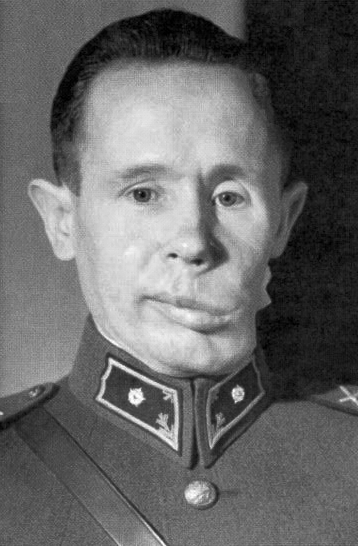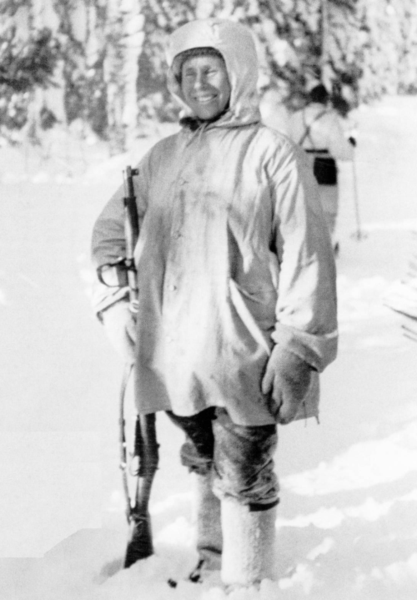<Back to Index>
- Mathematician Marius Sophus Lie, 1842
- Painter Paul César Helleu, 1859
- Second Lieutenant Sniper Simo Häyhä, 1905
PAGE SPONSOR



Simo Häyhä (December 17, 1905 – April 1, 2002), nicknamed "White Death" (Russian: Белая смерть, Belaya Smert; Finnish: Valkoinen Kuolema; Swedish: den Vita Döden; German: der weiße Tod) by the Red Army, was a Finnish sniper. Using a modified Mosin - Nagant in the Winter War, he has the highest recorded number (505) of confirmed kills in any major war.
Häyhä was born in the municipality of Rautjärvi near the present day border of Finland and Russia, and started his military service in 1925. Before entering combat, Häyhä was a farmer and a hunter. His farmhouse was reportedly full of trophies for marksmanship. It was during the Winter War (1939 – 1940), between Finland and the Soviet Union, that he began his duty as a sniper and fought for the Finnish Army against the Red Army.
In temperatures between −40 and −20 degrees Celsius, dressed completely in white camouflage, Häyhä was credited with 505 confirmed kills of Soviet soldiers. 542 if unconfirmed deaths are included. The unofficial Finnish front line figure from the battlefield of Kollaa places the number of Häyhä's sniper kills over 800. A daily account of the kills at Kollaa was conducted for the Finnish snipers. Besides his sniper kills, Häyhä was also credited with over two hundred kills with a Suomi KP/-31 submachine gun, thus bringing his credited kills to at least 705. Remarkably, all of Häyhä's kills were accomplished in fewer than 100 days with a very limited amount of daylight per day.
Häyhä used a Finnish militia variant, White Guard M/28 "Pystykorva" or "Spitz", of the Russian Mosin - Nagant rifle, because it suited his small frame (5 ft 3 in/1.60 m). He preferred to use iron sights rather than telescopic sights to present a smaller target (the sniper must raise his head higher when using a telescopic sight), to prevent visibility risks (a telescopic sight's glass can fog up easily), and aid concealment (sunlight glare in telescopic sight lenses can reveal a sniper's position). Another tactic used by Häyhä was to compact the snow in front of him so that the shot would not disturb the snow and reveal his position. He also kept snow in his mouth so that when breathing the steam would not give him away.
The
Soviets tried several ploys to get rid of him, including counter snipers and artillery strikes.
On March 6, 1940, Häyhä was shot in the jaw during combat by
a Russian soldier. The bullet tumbled upon impact and left his head. He
was picked up by fellow soldiers who said "half his head was missing"
but he was not dead. He regained consciousness on March 13, the day peace was
declared. Shortly after the war, Häyhä was promoted
straight from corporal to second
lieutenant by Field Marshal Carl Gustaf
Emil Mannerheim. No one else has ever gained rank in such a
quick fashion in Finland's military history. It
took several years for Häyhä to recuperate from his wound.
The bullet had crushed his jaw and blown off his left cheek.
Nonetheless, he made a full recovery and became a successful moose hunter and dog breeder after World War II,
and hunted with Finnish president Urho Kekkonen. When
asked in 1998 how he had become such a good shooter, he answered,
"practice." When asked if he regretted killing so many people, he said
"I did what I was told to as well as I could." Simo Häyhä
spent his last years in Ruokolahti,
a small village located in southeastern Finland, near the Russian
border.